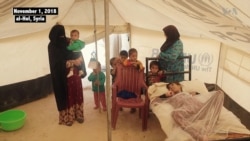Despite their cities and towns being freed from Islamic State (IS) militants, many Iraqi refugees who have settled in Syria say that do not wish to return to their homes.
Iraqi refugees interviewed by VOA at al-Hol camp in northeastern Syria voiced doubts about a possible return to their home country in the near future.
"I have no money to move back to Iraq," said Jihan Najim, an Iraqi refugee who escaped in 2015 when IS took over her village in Iraq's Anbar province.
"I don't have family left in Iraq. I only have some women relatives at the camp," she said.
"It would be very difficult to go back and resettle in Iraq while there is no guarantee of livelihood," she added.
Another female refugee said that while life in the Syrian camp is tough, it is still better than living under uncertainty in Iraq.
"I have a disabled daughter who needs constant medical attention," said Um Fatima. "At least I can get her some medicine for free through aid organizations."
"But life in Iraq is very expensive. If I go back I wouldn't even afford to take her for a doctor visit," she added.
WATCH: Paralyzed Iraqi Woman Struggles at Syria Refugee Camp
Al-Hol camp was established in April 2015 to host Iraqi refugees fleeing violence after IS took over parts of northern and western Iraq.
There are approximately 10,000 Iraqi refugees currently living at the camp, while a few thousand other Iraqi refugees are settled in two other camps in Syria.
Al-Hol is administered by the semi-autonomous local Kurdish administration.
The U.N. refugee agency UNHCR is providing aid to the people in the camp. There are local aid organizations as well that are helping the refugees.
But local aid organizations complain about shortages in aid provided to the camp population.
"We have limited resources here," said Masud Remo of the Kurdish Red Crescent.
"We can't provide refugees with everything they need. International organizations should step up their efforts in this regard," Remo added.
Repatriation
Since the liberation of Mosul and other major Iraqi cities from IS, the Iraqi government has been working to facilitate the return of Iraqi refugees from Syria.
"There is an understanding between the Iraqi government and local Kurdish administration in Syria with regards to returning Iraqi refugees to their country," said Alav Hossein, a Syrian journalist who closely follows the situation in the region, told VOA.
"The Iraqi government has a vetting process through which it handles the return of Iraqi nationals who wish to return to Iraq. They want to make sure that these people have no affiliation with [IS]," he said.
"That's why the process of sending these refugees has been slow," he added.
In October, about 340 Iraq refugees returned to their country from Syria, according to the Iraqi Ministry of Migration and Displacement.
UNHCR reported that in September, about 1,540 others returned from al-Hol and Akda camps to Iraq.






